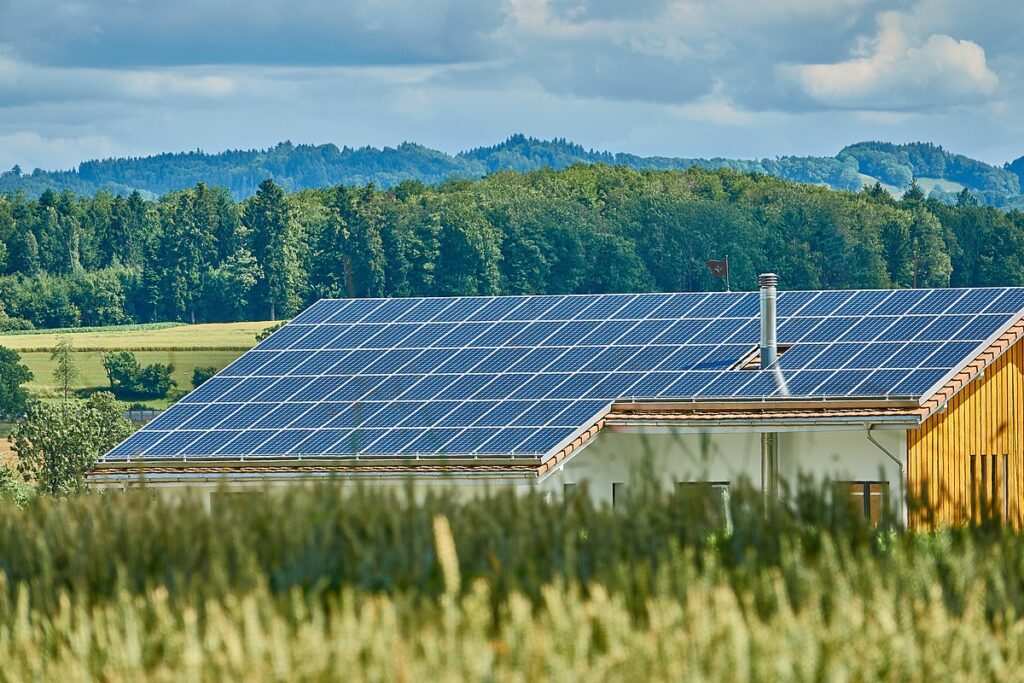INTRODUCTION: INDIA'S STEP TOWARDS SOLAR ENERGY
In a progressive leap toward sustainability, Indian Prime Minister Narendra Modi, on January 22, 2024, announced an ambitious pledge aimed at making India reliant on renewable energy. The pledge not only underlines India’s commitment to tackling climate change but also proposes a transformative energy
landscape by equipping one crore Indian households with solar panels to offset electricity bills.

Unveiling the Pledge: An Emphasis on Renewable Energy
Prime Minister Narendra Modi’s latest declaration manifests a monumental shift in India’s energy strategy. This visionary plan spotlights India’s strong resolve to transition into a nation fueled predominantly by renewable energy, with a particular focus on the power of the sun. This progressive move exhibits a conscious departure from India’s longstanding reliance on nonrenewable fossil fuels and aligns the nation with global endeavors to tackle the adverse
effects of climate change.
The inception of this commitment underscores the importance of solar energy in India’s pursuit of sustainability. The utilization of solar energy aligns perfectly with the nation’s geographical advantage of ample sunlight throughout the year. It exemplifies the potential that this renewable energy source holds in fueling India’s stride toward an environmentally friendly future.
This bold step towards renewable energy also indicates a significant transformation in India’s infrastructure and opens up avenues for boosting economic growth. It presents an opportunity for increased job creation, fosters innovation in renewable technologies, and has the potential to significantly decrease the country’s carbon footprint.
India’s future now gleams brighter under the sun, thanks to Modi’s audacious pledge. It is a testament to the country’s commitment to the battle against climate change and a promise to its citizens for a cleaner, greener, and more sustainable future. However, as we look toward this brighter future, it is also important to recognize and prepare for the challenges that lie ahead in realizing this grand vision.

The Significant Role of Solar Energy in India
Solar energy stands at the forefront of India’s renewable energy strategy, leveraging the country’s abundant exposure to sunlight. With Prime Minister Modi’s recent announcement, the significance of solar energy in the Indian energy landscape is unequivocal. This pledge propels solar energy from the realm of potential to an actionable part of India’s path to sustainability.
The embrace of solar energy is set to spur an array of opportunities across the country. It presents a unique prospect for job creation and promotes innovation, particularly in the development and application of renewable technologies. The benefits are not just economical, but they also extend to public health. By reducing reliance on fossil fuels, solar energy can curtail pollution levels, contributing to improved air quality and overall public health.
Furthermore, the push towards solar energy reiterates India’s commitment to the Sustainable Development Goals. The implementation of solar panels, aimed at one crore households, underscores this commitment and also provides a tangible, relatable element to this broad, national goal. The path to a solar-energized India, though marked with challenges, shines brightly with opportunities. This new chapter in India’s energy story reinforces the significance of solar energy, and its potential to reframe India’s energy narrative, moving towards a greener, cleaner future.
The Environmental Impact and Long-Term Sustainability
Embracing solar energy carries profound environmental implications. It stands as a significant counter-measure against escalating greenhouse gas emissions, slashing India’s carbon contribution and aiding in the global fight against climate change. As a country with a high population density, India’s shift towards this renewable source can have a far-reaching impact on the global carbon footprint.
Solar energy, devoid of the harmful pollutants associated with fossil fuels, promotes a healthier environment. By curbing air and water pollution, it has the potential to safeguard biodiversity and reduce the burden on our health systems caused by pollution-induced illnesses. Not only does this renewable source contribute to better air quality, but it also saves vast quantities of water that would otherwise be consumed in traditional power production processes.
On the path of long-term sustainability, solar energy stands out as a beacon. This form of energy, abundant and inexhaustible, ensures a sustainable supply that can serve future generations without depleting the planet’s resources. As India pledges to harness the power of the sun, it marks a significant stride towards securing an environmentally sound future for its citizens and playing a proactive role in the global sustainability drive.
This solar pivot also echoes India’s dedication to the Paris Agreement, reaffirming its commitment to renewable energy and marking a major stride towards realizing these international goals. The environmental and sustainability aspects of this initiative underscore the importance of this major shift in India’s energy policy and the country’s commitment to playing its part in the global fight against climate change
Economic Implications of the Initiative
Prime Minister Modi’s solar initiative, while offering considerable environmental benefits, also shines a spotlight on intriguing economic prospects. By arming households with solar panels, families across the country stand to experience a marked reduction in their electricity bills, contributing to significant savings over time. The spillover effect extends to the manufacturing sector as well. With an uptick in the production of solar panels, the sector could witness a surge in job creation, a much-needed boost in these challenging times. This presents a golden opportunity to enhance the livelihoods of countless Indians, particularly in rural and underserved areas.
Moreover, the solar energy sector itself represents an untapped market teeming with investment potential. As the country gears up for this grand shift towards renewable energy, investors will undoubtedly see this sector as fertile ground for growth and innovation. This initiative could very well be the catalyst that propels India’s renewable energy sector to new heights, paving the way for a wave of entrepreneurship and innovation in clean technologies.
On a macro scale, the move towards renewable energy could serve as a strong counteractive measure against inflation and energy price volatility. The stable nature of solar energy costs, as opposed to the fluctuating costs of fossil fuels, could enhance India’s economic stability and resilience.
Clearly, this isn’t just an environmental or infrastructural project; it’s a comprehensive economic strategy that promises a win-win situation for the country’s populace and economy. As India embarks on this solar journey, the country is not only charting a greener path but also a prosperous and sustainable economic future. The economic implications of Modi’s initiative, thus, are as far-reaching and profound as its environmental impact.
The Execution Strategy and Potential Challenges
Implementing Prime Minister Modi’s solar energy vision won’t be a walk in the park; it demands a multi-pronged strategy, unyielding commitment, and efficient problem-solving at various stages. Primarily, the plan requires robust infrastructure capable of accommodating the widespread distribution and installation of solar panels. It calls for investments in technological upgrades, research and development, and, notably, training to nurture a competent workforce.
The next puzzle to solve lies in sparking public awareness and acceptance. For the solar revolution to take root, the population must understand the benefits of switching to solar energy and be willing to make the transition. Educational campaigns, attractive incentives, and easy access to solar technologies can facilitate this process.
On the policy front, the government has to ensure supportive legislation and policies that encourage renewable energy adoption. This involves ironing out regulatory hurdles, creating an environment conducive for private sector participation, and securing international collaborations for technological and financial support.
Investment, of course, will be pivotal. Mobilizing capital—both domestic and foreign—is crucial for scaling up solar energy production and deployment. This might mean providing tax incentives for investors, boosting public-private partnerships, or leveraging international funds
committed to tackling climate change.
Then, there are the logistical challenges. How do you ensure that one crore solar panels reach the targeted households and get installed effectively? What about the manufacturing capacities required to produce these panels?
How do you ensure a steady supply of raw materials? These are just some of the pressing questions that need to be addressed in the execution phase.
Lastly, it’s essential not to overlook the need for skilled labor. Scaling up solar energy will necessitate a workforce well versed in installing and maintaining solar panels, which in turn calls for targeted training and capacity-building programs.
In essence, realizing Modi’s solar vision requires a well-thought-out execution strategy—one that is prepared to confront and overcome a myriad of challenges that lie ahead.
A Revolutionary Step towards a Sustainable Future
As India gears up to embrace the future, Modi’s pledge marks a groundbreaking shift towards sustainable living. This is not just an energy transition, but a monumental step towards a sustainable future that resonates with global efforts to mitigate climate change. India is at the cusp of a renewable energy revolution, one that has the power to redefine its energy narrative.
This is a moment of transformation, as India readies to shift from fossil-fuel reliance to dominating the renewable energy landscape. A moment that sees India not just participating in the worldwide push towards renewables, but actively leading it.
The country is setting itself up as a beacon of renewable energy, reflecting a future where sustainability is not just a goal, but a way of life. India is not just envisioning a future powered by renewable energy, it’s preparing to live it
Conclusion: The Global Relevance of Modi's Pledge
The solar energy commitment made by India’s Prime Minister Narendra Modi has far-reaching global implications. As India takes its place as one of the world’s largest economies and thesecond most populous country, its shift toward solar energy sends a resonating and potent
message to the global community.
It underscores the urgent necessity for international collaboration in the battle against climate change and the pursuit of a sustainable future. This ambitious pledge, which propels India to the forefront of the renewable energy revolution, embodies the country’s resolve to not just participate in, but lead the global charge towards sustainability.
This initiative paints Modi in a new light, as a trailblazer in the realm of sustainable solutions and innovation. In essence, this pledge doesn’t merely carry India’s promise to its people, but it also serves as a global call to action, reinforcing the collective responsibility we hold in preserving our planet for future generations.
To know about Government Steps Towards Coal/Lignite Gasification Scheme click on the highlighted link…
